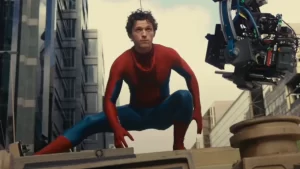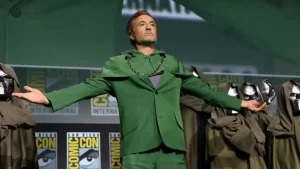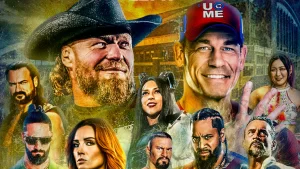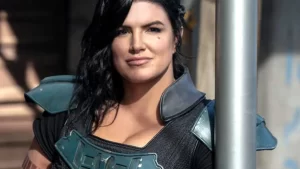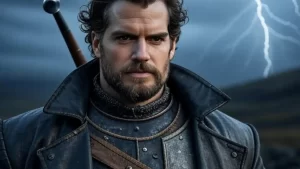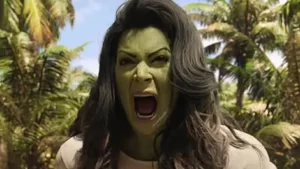In Need Of A Bigger Gun
This is truly the age of super-heroes. With the recent advances in digital filmmaking and computer graphics over the past 10 years, we have been privy to an amalgamation of imagery that simply cannot be captured by smoke and mirrors. The icons we’ve read about in comics have been fully realized, but have they been properly applied?
Certainly with big licenses come big box office expectations and equally large stereotypes regarding the “summer movie blockbuster.” The film that sent Hollywood down this path was The Matrix (1999) and Keanu Reeves aside, this film does not get enough credit for its inventive and imaginative plot. At its base lies a standard super-hero sci-fi flick. When you peel away the surface, you get a very insightful introspective as to the nature of humanity and our perceptions of reality.
I’ve not known such a heroic effort on the part of such a film to sneak in some substance underneath the spectacle. Film adaptations of comic book heroes are quite capable of continuing this trend, but the temptation to succumb to formulaic filmmaking as decreed by studio executives and corporate sponsors has an uncanny ability to turn gold back into lead.
Iron Man 2is unfortunately an example of “the formula” at its best, but that’s not to say it isn’t worth one viewing. This film does some things right. When there are action scenes, the artists behind all the CG magic earn their paychecks. If a man in a metal suit could fly, that’s the way he should fly. The use of “hand-held” camera effects, as opposed to a steady-cam, during the most intense action sequences can be a little frustrating. It’s fairly easy to lose track of Iron Man or War Machine because there is simply so much happening/exploding/shooting on the screen at once that an overload is inevitable. The only real weakness of all this action is that you’re left wondering where the rest of it went by the time the credits start rolling.
Robert Downey Jr. steals every scene because he doesn’t play Tony Stark, he is Tony Stark. Downey makes us love and loathe Stark in equal parts because the man simply knows how to do arrogant and conceited. However, it is Stark’s brilliance that sells the audience because Downey doesn’t just participate in dialogue with the other actors, he attacks them! He is sharp with the one-liners, unrelenting with the pace of his delivery and when his character is left speechless, we are stupefied because the audience is expecting Tony Stark to be in control all the time.
This is where the plot begins to get interesting because despite the problems that arise from the appearance of a new super-villain to complicated feelings he has for his personal assistant, the real challenge for Tony Stark has always been the rest of the world, or more precisely, how he fits into it.
The remaining cast is filled out with A-listers, but Justin Theroux’s screenplay leaves much to be desired for any character not named Tony Stark. Mickey Rourke is an excellent character actor and his Russian accent for Ivan Vanko throughout the film was superb. I wish Rourke had more lines, but apparently the director (Jon Favreau) felt he was more useful looking like a bad ass, which he also does quite well. Don Cheadle was always the man targeted for the role of James Rhodes, but Terrence Howard was tapped for the first Iron Man film due to scheduling issues and flavor of the week status (thank you, Hustle and Flow). Cheadle is an upgrade, but I bring up the issue of screen time and the inability for any secondary character to develop. Rhodes is supposed to be Tony Stark’s best friend in the world and he has a whole three scenes in the film to build that relationship with.
Fans were enthralled when that photo of Scarlett Johansson crouching in Black Widow apparel was released to the public. Too bad that was the alpha and omega of her character. Her custom-made, mini-action sequence was nice, but nothing you haven’t seen before. Scarlett was cast to represent the sex and although she’s got that in spades, Natasha Romanoff is a much more important character to Tony Stark than Pepper Potts, especially if The Avengers film in 2012 will be a direct adaptation of The Ultimates.
And speaking of Pepper, the need to have Tony Stark morally grounded to Gwyneth Paltrow’s cookie-cutter rendition escapes me completely. Stark doesn’t need validation in courting a good woman because he gains it by coming to peace with his past and getting mature about his future. Developing the theme of legacy would have been better served by more screen time with Rhodes or history with Stark’s father.
In any given film, the director is ultimately responsible for the actors’ performances and for the camera being put in the correct places to capture said performances. Jon Favreau does an acceptable job at this, but I never understood why a consummate character actor was even allowed to helm a franchise of this magnitude in the first place. Perhaps I simply underestimated the combined success of Elf (2003) and Zathura: A Space Adventure (2005)? Be that as it may, Favreau is working with seasoned veterans here and never needed to do any heavy lifting himself. I did not appreciate him giving his own character, Happy Hogan, more lines and prominence in this film because he has no relevance to the story and screen time was a premium. Then again, if I were directing a film in which Scarlett Johansson was cast, I too would create a character for myself and put that character in as many scenes with her as possible.
In the end, this film crumbles under the weight of its own hype. The main culprit for this was a severe lack of pacing. The film hits a small peak in the beginning and then flat lines for a solid hour of dialogue and exposition. All of that would have been easily overlooked if the climax had been a little more climactic, but then, there was no real build-up in the first place.
This film does a very good job at getting into Tony Stark’s personal life amidst the chaos that is very much his own doing. I enjoyed the use of the media’s eye (CSPAN, Bill O’Reilley, Christiane Amanpour) to add credibility to the fantastic nature of the Iron Man story. I also liked some of the ideas that the film was on the cusp of embracing. Stark’s testimony to Congress could have been a great springboard to fully engage the issue of personal responsibility with singular greatness, private rights versus government rights and the facade of business ethics, but that would have been a three-hour film and that would mean two less audiences per screen, per day.

![[page_title]](https://cosmicbook.news/wp-content/uploads/2022/08/cosmic-book-news-default-featured-image.webp)
